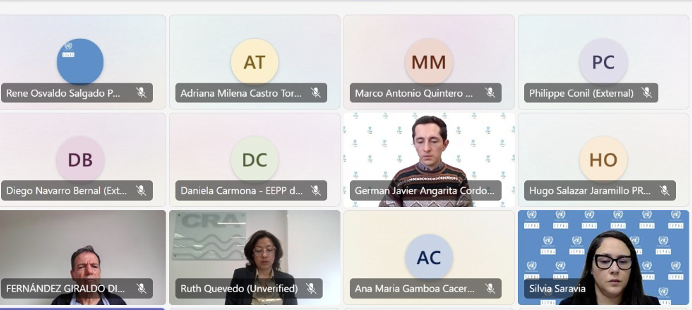Launch of the Circular Economy Initiative in Wastewater Treatment Plants for Methane Recovery in Colombia
Work area(s)
Topic(s)
On Thursday, March 27, 2025, a virtual event marked the official launch of a joint initiative between the Water and Basic Sanitation Regulation Commission (CRA), the Ministry of Energy of Colombia, and the Economic Commission for Latin America and the Caribbean (ECLAC). The initiative aims to apply a circular economy approach to wastewater treatment plants (WWTPs) in the country, promoting the capture and valorization of methane as a strategy to mitigate climate change and improve the energy efficiency of the sector.

The inaugural session featured welcome remarks from Ms. Nelly Mogollón Montañez, Executive Director of the CRA, who emphasized the CRA’s commitment to transforming the sanitation sector in Colombia. Ms. Isleany Angulo, Advisor to the Colombian Vice Ministry of Energy, also spoke, highlighting the potential of this joint initiative to be integrated into the country’s roadmap for a just energy transition. Ms. Rayén Quiroga, Head of the Water and Biodiversity Unit at ECLAC, underscored the strategic value of the project and expressed appreciation for the willingness for interinstitutional collaboration in the country. She noted that this initiative represents a key step toward more innovative, sustainable, and integrated water management aligned with regional climate commitments.
During the technical segment, Commissioner Expert Ms. Ruth Quevedo and Ms. Laura Villamil, CRA’s technical leader, presented the initiative’s objectives and methodological approach. They explained that the project will identify the methane recovery potential in more than 80 treatment plants located across various regions of the country, assess their financial and technical feasibility, and propose replicable models.
Ms. Silvia Saravia Matus, Economic Affairs Officer at ECLAC, focused her remarks on presenting the main findings from ECLAC’s work on circular economy in small and medium-sized WWTPs in Latin America and the Caribbean. She explained that less than half of the region’s wastewater receives adequate treatment, and that water stress and pollution remain structural challenges. Using field data and economic models applied in five countries, she demonstrated that investments in methane recovery technologies in medium-sized plants could be recouped in under six years, with a benefit-cost ratio of USD 1.35, along with positive side effects on public health and emissions reduction. She also shared case studies from small treatment plants, where economic returns were even faster. She concluded by emphasizing that this approach should not only be applied in major urban centers, but also in intermediate cities and smaller municipalities, as a way to bridge infrastructure and efficiency gaps in both water and energy sectors.
Next, Mr. Diego Fernández, Senior Consultant for ECLAC, explored the effects of methane as a high-impact greenhouse gas and discussed the technical potential of small and medium-sized WWTPs in the Colombian context. He stressed that these facilities, commonly viewed as operational liabilities, can be transformed into energy assets with the proper technical support and regulatory framework. He noted the fertile ground in Latin America and the Caribbean to scale these types of solutions, with benefits ranging from energy savings to distributed generation in non-interconnected areas. He also highlighted emerging opportunities in climate finance and thematic bonds to drive these circular transformations in the national and regional water and sanitation sector.
From the Ministry of Energy, Ms. Isleany Angulo took the floor again to emphasize the synergy between water and energy. She indicated that the project aligns with national strategies for decarbonization and energy decentralization, and could catalyze the creation of sustainable energy communities.
The international experience was presented by Eng. Carlos Flórez Chavarría, Advisor to the Salvadoran Water Authority (ASA), who showcased the successful case of the Metapán treatment plant in El Salvador. This city, supported by ECLAC since 2023, is implementing an investment plan in methane capture systems that will generate significant savings and environmental benefits. His presentation offered a practical perspective on the applicability of such solutions in similar contexts.
Finally, Ms. Laura Villamil closed the event with an open invitation to other WWTP providers and operators in the country to join this initiative, emphasizing its aim to build a national network for regulatory and operational innovation in circular economy within the water sector. She also noted that Colombia’s success stories will be featured in the 5th Edition of the 2025 Regional Water Dialogues, as the country is making notable advances in scaling circular economy practices in the drinking water and sanitation sector.
The launch of this initiative marks a decisive step in bridging public policy, technical knowledge, and institutional commitment. The partnership between ECLAC, the CRA, and the Ministry of Energy demonstrates that, under the right conditions, WWTPs can become key hubs for climate mitigation, energy efficiency, and local development in Latin America and the Caribbean.
Country(ies)
- Colombia